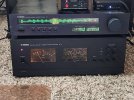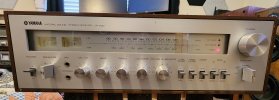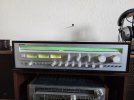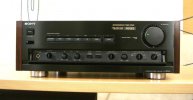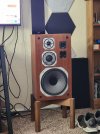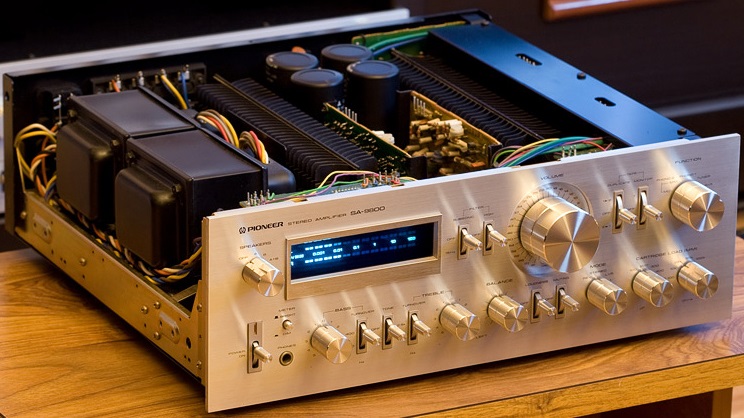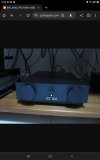MAB
Major Contributor
I'm a fan of classic integrated amplifiers, so I thought I would start a thread to celebrate these great devices!
The 1970's and '80s seemed to me as the heyday for integrated amplifiers. Several manufacturers had models with flagship performance and features. These features made it down to models lower in the line and were fantastic alternatives to receivers, and often had better performance and more flexible features. The minimum set for an integrated was typically two or three line-level inputs, a phono input, and a tape loop, speaker selection, plus a headphone jack. High end models had more inputs, multiple tape loops, multiple phono inputs with adjustable loading, processor loops, and pre-out and main-in. They are in many ways future proof. One of my favorite manufacturers is Yamaha. I bought a CA-2010 nearly 40 years ago and have listened to it almost every day since. Yamaha has kept to this aesthetic, and many of the new crop of retro-style gear seems to follow suit as well, even as many manufacturers omit some of the nice features that made these pieces great back in the day.


I've used it in so many configurations: multiple analog and digital tape gear looped, outboard processing like a Yamaha DSP-1 surround field processor and outboard amps, with an external electronic subwoofer crossover. The amp has Class A mode which is inaudible unless you clip the amp, then the Class A mode becomes audible. The tone control section is nice too. To be honest, if you want to improve on this old design in a modern unit, you could swap the tone controls for DSP-based PEQ, implement Yamaha's very good variable loudness in DSP as well. Extra credit would be flexible IO for multi sub integration. Double extra credit would be RIAA EQ in DSP.
The tone control section is nice too. To be honest, if you want to improve on this old design in a modern unit, you could swap the tone controls for DSP-based PEQ, implement Yamaha's very good variable loudness in DSP as well. Extra credit would be flexible IO for multi sub integration. Double extra credit would be RIAA EQ in DSP.
On the other end of the spectrum, there were many micro-component systems available. I see micro-components are in fashion again! I have an Aiwa micro-system including an A22 integrated amp. Another piece that has seen daily use in my family. It is cute and has features that modern micro-components often omit. It's not as luxurious or performant as the CA-2010, but it has a good feel with well thought out front panel.

It was part of an entire ecosystem of components:

Mix and match at your peril! Unfortunately, it seemed that the competition was stiff and many manufacturers started releasing new redundant models, similar to the predicament we have with current micro-craze.
Unfortunately, it seemed that the competition was stiff and many manufacturers started releasing new redundant models, similar to the predicament we have with current micro-craze.

Sometimes manufactures reach a bit too hard. Kyocera had a line of very nice sounding gear. The TOTL A-910 and A-710 integrated amplifiers showcased Kyocera's expertise in ceramics.


Combined with the performance of their tuner, these units were really good sounding and packed with features. Unfortunately, the desire to implement Kyocera's ceramics expertise in proprietary components made these fragile and nearly unserviceable, with nearly 100% long term reliability. And these suffer from another recently revived craze as reported here: encapsulated components that lead to poor reliability.
There are of course holy-grail types, like the Sansui AU-20000. I always found these desirable!

There are so many other manufacturers and models. I would be happy to hear from the community about their experiences with integrated amplifiers, both classic and modern. And some pictures!
The 1970's and '80s seemed to me as the heyday for integrated amplifiers. Several manufacturers had models with flagship performance and features. These features made it down to models lower in the line and were fantastic alternatives to receivers, and often had better performance and more flexible features. The minimum set for an integrated was typically two or three line-level inputs, a phono input, and a tape loop, speaker selection, plus a headphone jack. High end models had more inputs, multiple tape loops, multiple phono inputs with adjustable loading, processor loops, and pre-out and main-in. They are in many ways future proof. One of my favorite manufacturers is Yamaha. I bought a CA-2010 nearly 40 years ago and have listened to it almost every day since. Yamaha has kept to this aesthetic, and many of the new crop of retro-style gear seems to follow suit as well, even as many manufacturers omit some of the nice features that made these pieces great back in the day.
I've used it in so many configurations: multiple analog and digital tape gear looped, outboard processing like a Yamaha DSP-1 surround field processor and outboard amps, with an external electronic subwoofer crossover. The amp has Class A mode which is inaudible unless you clip the amp, then the Class A mode becomes audible.
On the other end of the spectrum, there were many micro-component systems available. I see micro-components are in fashion again! I have an Aiwa micro-system including an A22 integrated amp. Another piece that has seen daily use in my family. It is cute and has features that modern micro-components often omit. It's not as luxurious or performant as the CA-2010, but it has a good feel with well thought out front panel.
It was part of an entire ecosystem of components:
Mix and match at your peril!
Sometimes manufactures reach a bit too hard. Kyocera had a line of very nice sounding gear. The TOTL A-910 and A-710 integrated amplifiers showcased Kyocera's expertise in ceramics.
Combined with the performance of their tuner, these units were really good sounding and packed with features. Unfortunately, the desire to implement Kyocera's ceramics expertise in proprietary components made these fragile and nearly unserviceable, with nearly 100% long term reliability. And these suffer from another recently revived craze as reported here: encapsulated components that lead to poor reliability.
There are of course holy-grail types, like the Sansui AU-20000. I always found these desirable!
There are so many other manufacturers and models. I would be happy to hear from the community about their experiences with integrated amplifiers, both classic and modern. And some pictures!
Last edited:

